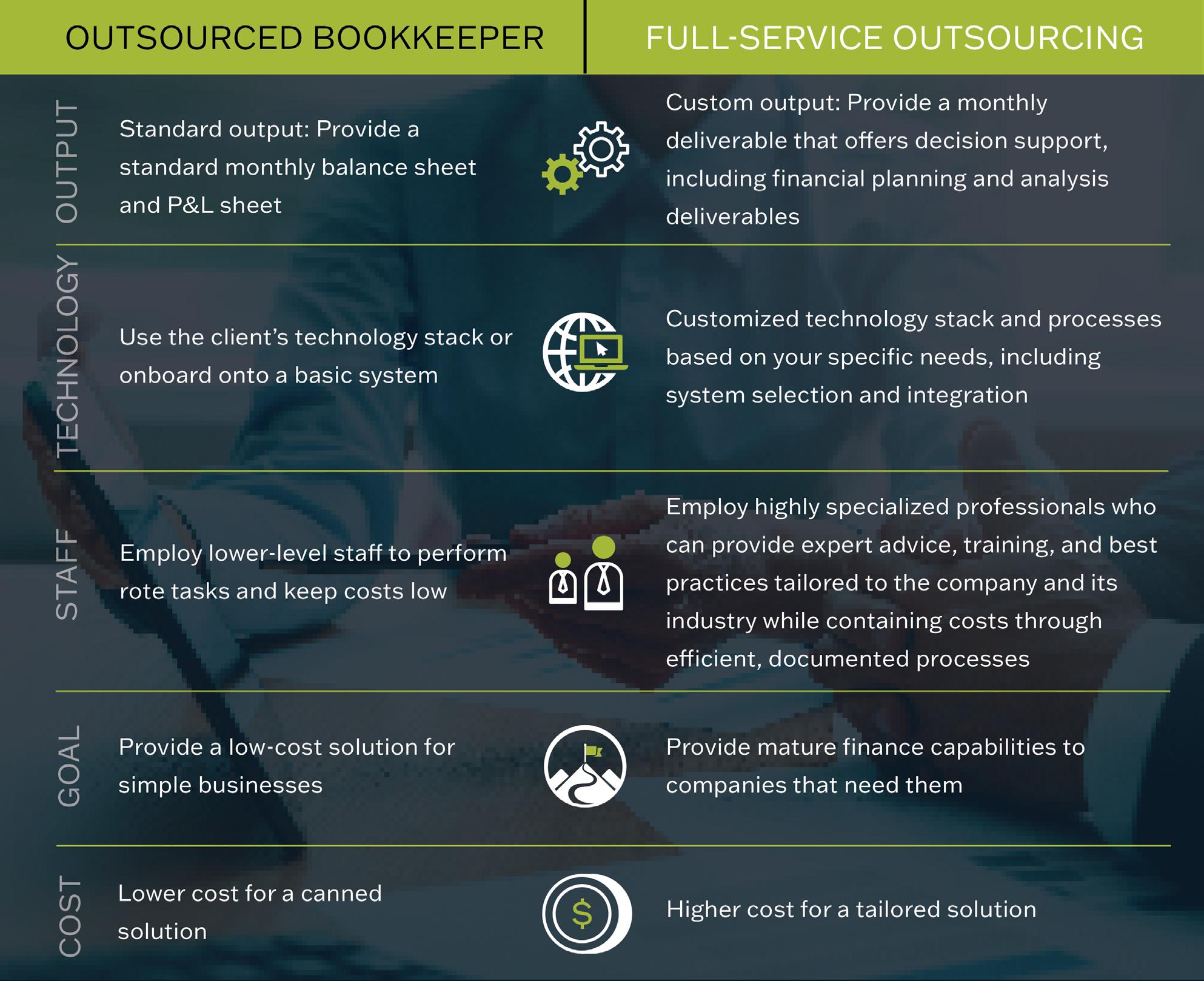
THE GUIDE TO OUTSOURCING FINANCE AND ACCOUNTING
Overcoming the finance and accounting hiring crunch


Overcoming the finance and accounting hiring crunch
IT HAS NEVER BEEN HARDER TO FIND QUALIFIED FINANCE AND ACCOUNTING TALENT, ESPECIALLY FOR MIDDLE MARKET BUSINESSES. A MAJORITY OF COMPANIES ARE HIRING FOR FINANCE AND ACCOUNTING ROLES AND NEARLY 90% OF THEM ARE STILL STRUGGLING TO FILL THESE POSITIONS.
According to the latest research by Robert Half:
Of finance and accounting managers are hiring for new roles
Of finance and accounting managers are backfilling vacated roles
Of finance and accounting managers say finding skilled talent is a challenge
It is no secret that we have been suffering from an acute accounting talent shortage for some time. Accounting graduates and certified public accountant (CPA) candidates have been on the decline for years. The American Institute of CPAs (AICPA) reports that “significant talent acquisition and retention challenges have occurred in the accounting profession and are likely to continue in 2024.”
In today’s competitive environment, your business needs financial results in real-time and the technology needed to achieve those results is changing faster than ever. Creating a finance and accounting department that can meet those needs is vital to ensuring your competitiveness in the marketplace. However, the challenges in getting the department to a mature state are arduous, so what is a savvy middle market company to do?
One solution gaining popularity is outsourcing your finance and accounting functions. When you hear about accounting outsourcing, you might think about a bookkeeper or your tax accountant closing out the books to prepare the tax returns — but in reality, it’s so much more.
In this guide, we will explore all the services you can now effectively and seamlessly outsource, and what that can do for your organization.


THERE IS A PARADOX FACING MIDDLE MARKET COMPANIES TODAY:
1
2
You need decision-support capabilities like advanced financial reporting, financial forecasting, budgeting, and dashboards for key performance indicators to make the best decisions about the direction of your company. Those capabilities are dependent on building out a finance and accounting team to support both the traditional monthly accounting processes, and the forward-looking, technology-driven decision support required in today’s business environment.
Technology is changing at a lightning pace and it is more difficult than ever to hire in-house talent that has the capabilities to ensure your company is keeping pace.

In recent years, accounting and corporate finance have become a much bigger driver of management decisions and the speed in which data can be processed has become a huge part of that.
Instead of just looking at financial and accounting metrics on a monthly basis for periods that have already finished, mature companies are now looking at these metrics weekly. They are also checking actual results against their budgets and forecasts to understand whether the business is performing as expected. This allows a company to be responsive to the market and make faster, more accurate management decisions about the direction of the company.
However, it’s easier said than done.
In order to improve the efficiency and effectiveness of your reporting processes, you need the right core accounting capabilities in addition to the required reporting and analytics tools. For instance, you may need to start automating standard transactional tasks so your team can move beyond manually updating the ledger and on to more analytical and value-added responsibilities like flash reporting, in-depth finance analysis, and increasing the number of key performance indicators (KPIs) available to management. All that requires a team of senior, experienced staff and for many companies, they do not need this staff on a full-time basis. The company may benefit more from a higher number of these finance specialties in fractional doses.
It would be very difficult and expensive for the average middle market company to build all of that expertise internally for a number of reasons. Due to the declining finance talent pipeline, the market for quality candidates in finance and accounting is very lean. While qualified professionals who have the specialized knowledge and skills your business needs do exist, they tend to work for larger companies that offer greater growth potential.
Adding the mix of technical accountants and analysts needed to achieve a high level of financial maturity also tends to be very expensive.
It's also not just a matter of finding individuals — you need well-defined roles and established processes so they can each spend their time focusing on the right functions. When turnover occurs, you need to account for the time and expenses of hiring and training new employees. There needs to be hands-on, day-to-day leadership in place to drive your processes and oversee the quality of their output. Over time, as the company grows, the growth of the finance department’s skills and capabilities need to align with certain types of specialized knowledge in areas such as technical GAAP accounting topics, new technology, and more advanced management accounting concepts like costing or profitability analysis. This can be very difficult if you only have access to internal full-time employees.
Modern finance outsourcing solutions run the gamut from low-cost transactional accounting to outsourced CFO services and everything in between. For many middle market companies, outsourcing can be more efficient and effective than hiring full-time staff — providing your business with access to specialized talent on-demand and allowing you to scale your team as needed. This allows management to more effectively manage a key overhead expense. According to a recent Robert Half report, 78 percent of finance organizations in the United States are planning to increase their use of contract professionals, a number that has only been increasing.
Not all outsourcing offerings are alike. Broadly, there are two main types: outsourced bookkeeping services and a full-service outsourcing model.
Outsourced bookkeepers provide basic accounting services. They will balance your books, record accounts payable and receivable transactions, reconcile cash, and provide you with a standard balance sheet and profit and loss (P&L) reports. To keep their services low-cost, they standardize their service and technology platform across their clients and try to keep those systems and processes consistent across their client portfolio. For simple business structures with basic accounting needs, this can be a viable low-cost, lowtouch option.
A full-service outsourcing model is more custom tailored to your company’s needs. Engaging a full-service outsourcing solution can help you build better processes, achieve a deeper and more insightful level of financial decision-making, and select and integrate the right technology to help you achieve faster, more accurate reporting. They can bring in industry specialists as needed to support or augment your team, stay current on the latest changes to both GAAP accounting standards and operating best practices, and help train and upskill your existing finance staff. Working with a full-service provider for your outsourcing needs allows you to establish a trusted advisor relationship, and scale up or scale down your service package as needed.

Our perspective is that not every company needs to strive for the highest level of financial maturity. Each company should individually evaluate the complexity of its business and determine the level of speed and maturity required on its reporting and analytics. If all you need is bookkeeping services, an outsourced bookkeeper can be a great and costeffective option. Business leaders should understand, however, that not investing in the accounting function can put you behind your competitors and have costly implications in the long run.
For most middle market companies with any level of financial complexity, you need much faster and more in-depth reporting to be able to make timely, well-informed decisions for your business that will make you profitable in the long run. An accelerated month-end close, more detailed processes and financial reporting (e.g. at a business unit, product, or customer segment level), regular forecasting with your P&L leaders, and an enhanced level of automation all add significant value to management. Choosing financial consulting as a service provider can unlock a world of additional benefits, which we’ll delve into in the next section.
Companies that embrace the open-talent model get their work done just as well as those that use traditional staffing models — but four to five times faster and eight to 10 times more cheaply.
— HARVARD BUSINESS REVIEW
GO FROM MANUAL TO MODERN IN A MATTER OF MONTHS
Achieve financial maturity in just 60 days.
Outsourcing allows you to achieve your financial goals faster than you could on your own. The right outsourcing solution will bring in a ready-made team — or experienced people to augment your existing systems and team — to quickly improve your financial capabilities. Having professionals that know your business model and industry is key to being able to improve every part of your finance function, from tech stack to people and processes.
Our outsourcing clients typically go from slow, manual processes (a level one or two on the scale below) to fast, in-depth reporting in about 60 days. 1
Disconnected people and processes
PEOPLE GOVERNANCE
TECHNOLOGY PROCESSES
DATA
Ill-defined roles and responsibilities
Manual, timeconsuming processes
Informal and ineffective policies and procedures
Unintegrated systems and data architecture
Limited data which is rarely used
Level 1:
Defined roles and responsibilities
Fewer manual processes
Defined policies and procedures
Common platforms
Ad hoc analysis; manual data cleansing
Transformation through automation
Well-trained and appropriately deployed staff
Centralized activities
Integrated policies and procedures
Integrated and automated systems
Data is clean, accessible, and easy to use
Leadership through innovation
Highly specialized staff
Fully automated processes
Automated governance
Machine learning / Artificial Intelligence
Predictive analytics
Level 4: INNOVATES
Top talent is hard to find. Cost accountants, finance managers, compliance officers, and financial analysts are currently the toughest roles to fill. —
ROBERT HALF
More than anyone else, middle market companies are struggling to find and hire top finance and accounting talent. Given that the industry is going to be understaffed for the foreseeable future, outsourcing is the most feasible way to access the best people who can be available almost immediately and transition seamlessly into your company’s accounting function.
Our outsourcing practice specializes in talent arbitrage. Because we have clients across a variety of industries and business types, we can offer career paths that are appealing to top-level accounting talent. Since we are always hiring, we have strong candidates joining our team on a continuous basis, not just the moment there is a need. We always work as a team. As people progress in their careers, there are strong candidates who are being trained and mentored behind them and can sustain excellent work quality while adopting best practices. All that means is we’ve already done the hard work of finding the right people for your finance and accounting function — and we can match folks who have the right skills and expertise for your needs.
Forty-four percent of managers cite staff turnover as a key reason they need to add to their teams.
— ROBERT HALF
Not only can you avoid a potentially long and arduous hiring process, but choosing to outsource also means you don’t have to worry about staff turnover. If you choose to hire in-house and an important staff member leaves on short notice, the lift for identifying and hiring the right replacement can be taxing and lengthy. When you work with an outsourced finance consultancy, you can easily scale up or scale down your outsourced team to meet your current needs. You can rest easy knowing that your finance team will have a high level of continuity.
For instance, say your controller quits with two weeks’ notice — your outsourcing partner will be able to provide a solution to execute the necessary responsibilities on an on-going basis, while continuing to train and mentor your lower-level accountants. Or perhaps your outsourcing partner will recommend that you don’t actually need a full-time controller, and they can instead provide you with fractional support for a certain number of hours each month and a resource at a different level to perform the transactional accounting work. This makes it so people can always work at their appropriate level and you only pay for them working at their most effective use.
46% of hiring managers say meeting candidates’ salary expectations is a challenge.
— ROBERT HALF
Talent is getting more expensive. Using an outsourced finance consultancy gives you access to the expertise you need without needing to hire full-time employees. If you compare it to the cost of having full-time employees cover all of the skill and knowledge areas you require, it can be more cost-effective. Ultimately you will gain a much broader range of skills and expertise through outsourced support. Furthermore, salaries of qualified accounting staff have been increasing disproportionately to the market. As a result, accessing a fractional solution will enable you to gain a more flexible option and more control over a normally expensive fixed cost.
Your outsourcing partner can help you build more efficient processes and systems, so you can meet your needs with experts in fractional roles. Instead of hiring a suite of full-time staff, you only have to pay for the hours you actually need.
Sixty percent of employers identify an inability to bridge skills gaps as a barrier to business transformation — WORLD ECONOMIC FORUM
The finance and tech landscape is constantly changing and it can be hard for small teams at middle market firms to stay on top of the latest best practices and technology in key accounting functions. When you choose to work with an outsourcing provider, the knowledge of all those best practices and the ability to implement the options that you want comes with your outsourcing engagement.
Through subject matter experts in various industry verticals, outsourced finance consultancies like ours are always on top of the latest trends, improvements, and new regulations. If you have an internal finance staff, you would likely have to bring in a third party to help you understand the latest standard and see how you can apply it, which carries additional costs. We consult on this for all of our clients as part of our core services.

Eighty-nine percent of finance and accounting senior managers in the US report challenges finding skilled talent. — ROBERT HALF
Evaluating a potential sale? Need to analyze and update your standard costs? Pursuing a new financing structure? For all these and other finance questions that come up in the course of managing your business. A full outsourcing firm has access to the specialists who can help you handle all of these issues as they are needed.
Having dedicated staff who already know your firm makes it easier to identify and engage these resources. They bring with them the tools, technical expertise, and methodologies that already integrate with how your books and records are being maintained. Our approach makes it so you receive high-level, senior capabilities for any of these areas as you need it.
Seventy-six percent of employees agree that they are more likely to stay with a company that offers continuous training. — TALENT LMS
Finally, bringing on an outsourcing partner can be a boon to your existing finance and accounting team. Your financial consultancy can help mentor your team and bring them up to speed on the latest best practices so they can be more efficient and start tackling more interesting challenges.
This is very much in your consultancy’s best interest — the more skilled your internal people are, the more efficient and effective your outsourcing partner will be. That reaps rewards for everyone involved. At Citrin Cooperman, we view ourselves as part of the internal finance and accounting team and focus on developing other team members’ technical and accounting skills.

Our solution to outsourcing finance and accounting allows us to provide all of the capabilities our clients need as they manage, grow, and evolve their businesses. We help your finance function become more efficient and effective through people, processes, governance, and technology.
When you choose to work with Citrin Cooperman as your outsourcing partner, here is what you can expect.
(Approximately 3 weeks)
The first step in our process is what we call a finance assessment. During this process, our team evaluates the quality of your documented procedures, the systems you are using, the maturity of your financial reporting, and the level of support the business currently receives from the accounting department. We identify where there might be opportunities for improvement and where there are significant issues or gaps. The result of this phase is a list of recommendations and an implementation roadmap that our team can help you achieve. The leader of this assessment stays engaged afterwards on an ongoing basis.
2
ONBOARDING (First month through to first close)
Often the rapid finance assessment results in the next phase, which focuses on the month-end close process. The month-end close starts with an onboarding phase, at which time we start implementing the findings from the assessment and setting up the delivery structure for our services. This includes:
• Establishing a month-end close checklist
• Documenting standard operating procedures
• Agreeing on financial reporting formats and KPIs
• Setting approval thresholds, workflows, and other key controls
• Onboarding the team who will perform all of the in-scope tasks
• Setting up the monthly deliverable deadlines and collaboration technology used to work with the client’s team

Once we have laid the foundation for our work together, we settle into a monthly cadence. In addition to your engagement lead, we have a team of dedicated staff divided into the different functions, who work alongside your internal staff. Our documented processes show everyone what’s assigned to them, and we have digital portals that everyone uses to track their deadlines and other weekly activities.
We pursue continuous, incremental improvement to your processes and financial information. We can provide much-needed external perspective so your finance and accounting functions can continue to improve.
4
Our ultimate goal is to provide management with decision support platforms that enable you to make crucial decisions about the direction of the company. These forward-looking tools include budgets, financial forecasts and re-forecasts, projections, and key performance indicator dashboards. We tailor these analyses to your specific needs and present them in a clear and concise format. Having the right decision-making support system in place is crucial to your company’s success.



Michael Zyborowicz
545-4800 mzyborowicz@citrincooperman.com


Kieran


Jenny E. Herrera Partner (301) 654-9000 jherrera@citrincooperman.com


(516) 931-3100 agallo@citrincooperman.com


